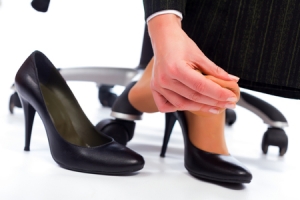Connect With Us
Blogs
Displaying items by tag: neuromas
How to Have Healthy Feet
January is a good time for starting new habits, and we at Superior Foot & Ankle Care Center would like to urge patients to make this the year that you commit to better care of your feet. We believe in educating our patients to be proactive about the health of their feet. There are many ways that you can reduce your risk of injury and foot disorders and improve your podiatric health. Below are some suggestions:
- Wash your feet every day with mild soap and warm water. Dry them thoroughly, with particular attention to the area between the toes. This will significantly reduce the risk of athlete’s foot.
- Don’t walk barefoot. Out in public, walking without shoes increase your risk of coming in contact with a fungal infection. Even at home, you can protect your feet from stepping on sharp objects by keeping them covered.
- Get in the habit of inspecting your feet on a regular basis. The best outcomes for foot disorders occur when they are treated in their earliest stages. Being vigilant about reporting changes in skin or nail color, swelling, bumps or growths, bruising and cuts that don’t seem to be healing to our podiatrists, Victoria Foley or Dr. Constance Ornelas, can save you from prolonged and invasive treatments.
- Making wise shoe choices. Did you know that the single most significant step you can take to improve the health of your feet is choosing good shoes? Styles with roomy toe boxes that don’t constrict your toes, adequate arch support and laces for a firm fit can reduce the risk of falls, joint conditions, and toe deformities. In addition, getting away from wearing high heels can prevent neuromas and lessen the chances of bunions and several other podiatric problems.
- Apply sunscreen, not just on beach days but any days when the bare skin of your feet will be exposed in open sandals or shoes to the sun. The skin on your feet is just as susceptible to skin cancer as the skin on the rest of your body.
- Take care of toenails. Keep your nails trimmed straight across and not too short to prevent ingrown toenails from developing.
Better foot care needn’t be complicated or time-consuming. A few simple changes in your daily regimen can make a world of difference. If you have questions regarding the care of your feet, contact our Long Beach office today by calling: (562) 420-9800.
Neuromas: A Prevalent Problem Among Active Professional Women
At Superior Foot & Ankle Care Center we see a high incidence of neuromas among professional women for whom running is the fitness activity of choice. A neuroma is a disorder where a nerve becomes inflamed and enlarged causing symptoms of pain, burning and tingling. Patients with neuromas often say it feels like there is a rock in their shoe or that their sock is bunched up under their foot. Women who spend their workdays in heels and then pound the pavement running after work may be unknowingly putting an extreme amount of pressure on the ball of their foot. What’s the high heel/high impact running connection? High heels push your foot forward and narrow toe boxes squeeze toes together—both of which put excess stress on a nerve that is located at the base of your toes in the ball of your foot. Combine this stress with the added irritation of high impact and repeated force from running and you have the perfect conditions for a neuroma to develop.
Unfortunately, many women don’t pick up on these signs right away. The symptoms usually come on gradually and massaging the ball of the foot or changing your shoes for a day or two may relieve the pain—but only temporarily. In fact, the temporary nerve damage can become permanent if a patient does not seek professional podiatric treatment promptly.
Relieving Symptoms
You can’t see a neuroma on an x-ray or diagnose it with a lab test. Our podiatrists, Dr. Victoria Foley or Dr. Constance Omelas will examine the affected foot and palpate the nerve as well as ask questions about your symptoms and their duration to determine how far your condition has progressed. There are several treatment options available, including:
- Rest from activities that aggravate the foot
- Icing
- Over the counter anti-inflammatory medications
- Orthotic devices to reduce compression and increase support to the foot
Surgery is reserved for severe cases where other methods have not worked. If you wear heels, run and are experiencing any pain or odd sensations in the ball of your foot contact our Long Beach office for an appointment at your earliest opportunity by calling: (562) 420-9800.


